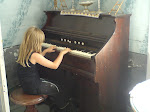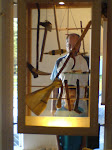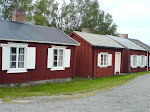*) or muck or dirt!?
It is a small cute dog here that wants to go out it looks now when I have sat down to write in the morning!! I wonder if I shall dress and take a walk with him before I write further?? J
Now back from the walk:
The speech Astrid Lindgren held in Frankfurt October 22, 1978 when she received the German bookseller’s peace prize had the title “Never violence” (“Aldrig våld” in Swedish).
The organization which gave it to her asked her not to hold it, just receive the prize, but Lindgren said no and that she wouldn’t come to the prize ceremony at all if she wasn’t allowed to hold just this speech and no other speech, and then they had to change their minds!!!
She starts this speech (which is published in its entity in this anthology) with wonders if we shouldn’t after all those thousand of years ask ourselves if there is a sort of constructional error in the human species since we always resort to violence. And if we are doomed to be ruined for our aggressions sake? Is there no possibility for us to change then, before it is too late? That we could learn to disclaim violence. Try to become another sort of human beings simply. But how and where shall we then start?
She thinks we have to start from the ground, the bottom. With the children.
My comment: And maybe we need many different perspectives on things in our world!!! From different angles, in different ways, from different persons, high and low, intellectual and not the leas intellectual (a former culture minister Bengt Göransson reflects in the anthology upon what made Lindgren such a success in moulding public opinion; and it wasn’t that she talked from above, but from an under perspective, spontaneously, directly etc. Maybe I write more about this too later)… Most the ones which are about our survival on this earth!!??
And she thinks that as they had chosen a child book author for this peace prize they couldn’t expect any political views, or perspectives, or suggestions to international solutions to problems. She wanted to talk about the children, simply. The ones that are going to take over this world. If there is anything left of it. Or what is left of it?
Do we want a society where the violence just keeps on increasing or do we want one where human beings live in peace and fellowship with each others? Is there any hope at all that we are going to create a more peaceful world than we have succeeded to create so far (if we see it from the pessimistic perspective)? And why haven’t we been more successful in spite of all good will? Se asked then, thirty years ago!!
She said that she remembered what a shock it was when she as a very young girl suddenly realized that those who ruled the countries and the world’s destiny were no gods with superior equipment or a divine clear vision. They were just human beings with the same faults and human weaknesses as she had. But the difference was that they had power and could each minute make the most fatal decisions, all after the impulses which ruled them (in that particular moment).
In the worse case a war could be started just because of one person’s desire for power or greediness of revenge or conceitedness or greediness to win or – which seems to be the most usual – blind faith and superstition in violence as the most effective tool in all situations. And at the same time just one good, calm human being can sometimes ward off catastrophes just by being good and calm and by distancing him/her from violence she meant.
She asked why there are so many who want violence and power? Is there an inborn evil wish or desire in some?
No, she believes there isn’t. She means that the decisive factor for if the child is going to turn out to a warm, open, confiding (trustful) human being with ability to community or a frigid, destructive “lonely wolf” is how the child is met when it comes into this world. If the people who meets the child and introduce it into the world can teach it what love it, by meeting it with love and respect or if they refuse to do this, if they refuse to take their responsibility for the child that has been brought into this world and put in their hands. No matter whether this child is going to play an important and decisive role or not. Every child deserves genuine love and respect and care despite this. Yes, no child has asked to come into this world, so I agree with this. But this is difficult, because so many of us are harmed more or less. We have to understand what has formed us (each of us ought to do this work) and at the same time avoid hurting the ones that are growing up (and of course all people).
Even coming statesmen’s or politician’s characters are formed before they have even turned five, this is awful but true she said. My addition: I have had a discussion with a friend about the need for power and control, and I think this plays a role here… I will probably come back to that topic later.
She reflects upon how children have been treated during history. And as she says, it has not all too seldom been about violence of some kind (yes, she said like this!!); physical or psychical, to break the child’s will. She asked: how often haven’t children got their first education in violence by “von denen die man liebt”, i.e., their own parents, and then passed these lectures further from generation to generation. “Spare the rod and you will spoil the child” (or how do one say this in English?) stands in the Old Testament, and many fathers and mothers have believed in this and diligently used the “rod” and called it “love”.
But all those “spoilt lads” (yes, she said so) round the world; the dictators, tyrants, oppressors, tormentors of human beings, which there are so many of in this very minute, if one should investigate what they have in their backgrounds, how their childhoods were. This we ought to inquire she thought. And she thought that behind most of these dictators, tyrants etc. there stand a tyrannical father or other fosterer with a rod or another whip in his hand.
She said in this speech: shouldn’t one get despaired when voices suddenly have been raised (fairly strongly then 1978? As they are today too, a well known child physician here Lars H Gustafsson criticizes the popular nanny-programs that have occurred the last years in TV here too unfortunately, maybe I will write more about this too. Yes, they feel fairly manipulative).
Voices for retrogression to the old authoritarian system, she said – then 1978. Which is what happens at many places in the world just now. Now one want “harder holds/grips” and “more tight reins” and believes that this shall help against all the youths bad habits which too much freedom and too little strictness in the upbringing is to blame they mean and say.
But that’s like trying to drive evil out with Beelzebub and will only in long term lead to more violence. These long-desired “harder holds” would possibly give a superficial effect which the pleaders maybe could interpret as an improvement until they would have to realize that violence breeds violence – as it has always done.
Many parents were probably worried by those signals and wondered what wrong they had done then (not learnt to trust themselves?)? If an antiauthoritarian upbringing is something to be condemned? It is, Lindgren thought, if it is misunderstood. She thinks there must be a mutual respect between children and parents. Children shall though not be left totally alone; left drifting at the mercy of the wind. But I would add that it must always start with the parents respect and love and care and enlightenment.
And then Lindgren told the story about the young mother and her son; Lindgren had met an old woman who told her this story: When she had been a young mother her little son had done something the mother thought she had to punish him for. She asked him to go out and fetch a birch for her so she could o this (or only threaten him with this? As the custom also was? In some homes the birch hang in the kitchen as a reminder). For the first time in his life (he was fairly small?). The little boy went out and was out for a long time. At last he came home crying and said:
“I didn’t find any birch, but here you have a stone you can throw on me”.Then the mother started to cry too, seeing the whole scene with the boys eyes. The child must have thought:
“My mom in fact wants to hurt me, and then why not use a stone”.They cried together and the mom put the stone on a shelf in the kitchen and there it lay as an eternal reminder about the promise she gave herself in that very moment:
“Never violence!”





























Inga kommentarer:
Skicka en kommentar